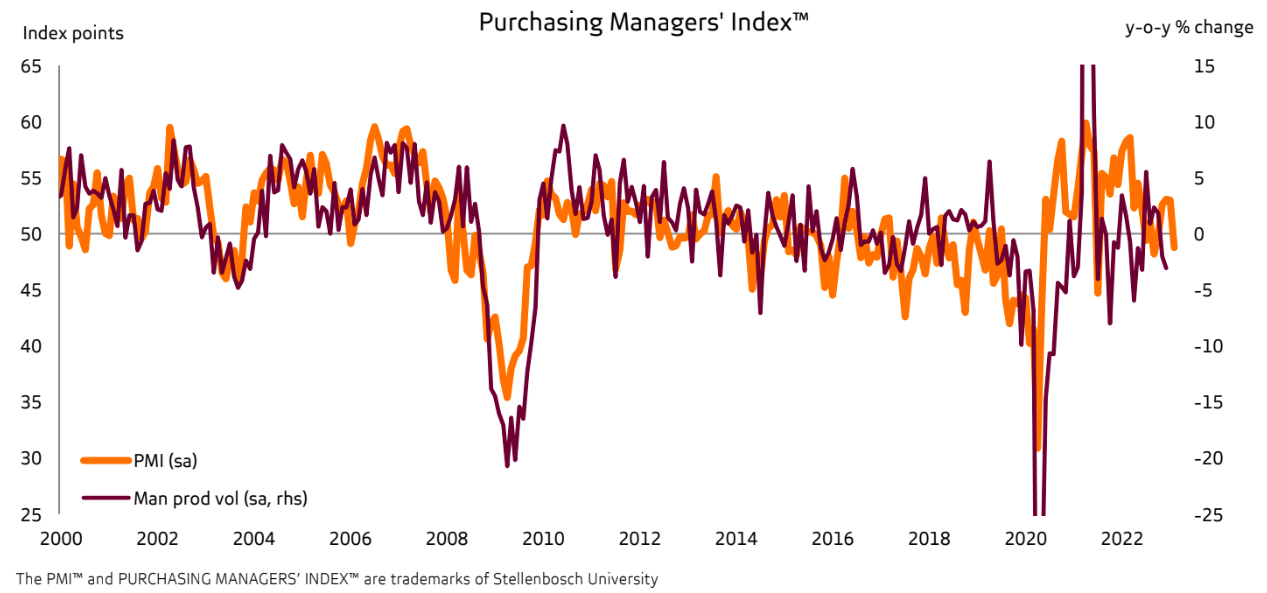ECONOMIC OUTLOOK
Absa Purchasing Managers’ Index contracts into negative terrain after power crisis crunches confidence

The Absa PMI’s fall brought it below the neutral 50 mark for the first time since September of last year. No surprise, as the survey of purchasing managers in the manufacturing sector took place against the backdrop of a surge in rolling blackouts.
The Absa Purchasing Managers’ Index (PMI) contracted sharply in February to 48.1 from 53.0 in January. The surge in rolling blackouts is diminishing confidence, a point underscored by the collapse of the index measuring expected business conditions six months out. It has only fallen more steeply twice before — in the wake of 9/11 and during the global financial crisis.
The Absa PMI’s fall brought it below the neutral 50 mark for the first time since September of last year. No surprise, as the survey of purchasing managers in the manufacturing sector took place against the backdrop of a surge in rolling blackouts.
“The February survey period included an unprecedented seven consecutive days of Stage 6 load shedding, which was likely top of mind for many respondents. Load shedding once again featured frequently in the commentary where respondents explained why activity declined relative to the previous month,” Absa said.
As usual, the subindices that comprise the overall index paint a mixed picture, but the general portrait is one of woe.
“A glimmer of good news was that export sales rose to the best level in a year, implying that producers supplying solely to the domestic market likely had a tough month,” Absa said.
Visit Daily Maverick’s home page for more news, analysis and investigations
That is not a shocker — most of South Africa’s export markets for manufactured goods have reliable power supplies and a state that is not melting down from corruption and incompetence. And their economies are in most cases almost certainly growing faster than South Africa’s, which cannot reach its potential because of power shortages.
This is what is known as a vicious cycle, and the other indices dimmed the “glimmer of hope” represented by export sales.
The most striking example is the index which measures “expected business conditions in six months’ time”. It collapsed in February to 46.8 from 63.8 in January, a fall of 17 points. It was last lower than this in April 2020, when the economy was rapidly contracting under the weight of lockdown restrictions and the business outlook was a smog of uncertainty.
This index, which looks six months ahead, has fallen more sharply before, according to data for the PMI going back to September 1999. In September 2001, it plunged by almost 21 index points to 66.4. And we all remember what happened on 11 September 2001, otherwise known as 9/11.
It also fell by almost 20 points in November 2008, when the global financial crisis was getting into full swing. In April 2020, it was 27.3, so much lower than its current read. But that fall was not even two index points as confidence was also draining in March 2020 as lockdown loomed.
So, the biggest previous falls in the subindex, which measures expected business conditions in six months’ time, came in the wake of the 9/11 terror attacks in the US and during the global financial crisis. There was no geopolitical event of that magnitude last month, and while the global economy remains fragile, it is in rebound mode.
That, folks, underscores the impact of the soaring levels of rolling power cuts on confidence, which the PMI in effect measures for purchasing managers — the people who order stuff for the manufacturing sector. Their outlook for business conditions in six months’ time has crumbled, and it is almost purely a consequence of the power crisis.
The outlook for economic growth this year — which ranges from a paltry 0.3% to a feeble 0.9% — is fading with each new set of data. And this is totally a domestic crisis, orchestrated by domestic actors who are dragging the whole economy down with them. DM/BM


















Comments - Please login in order to comment.